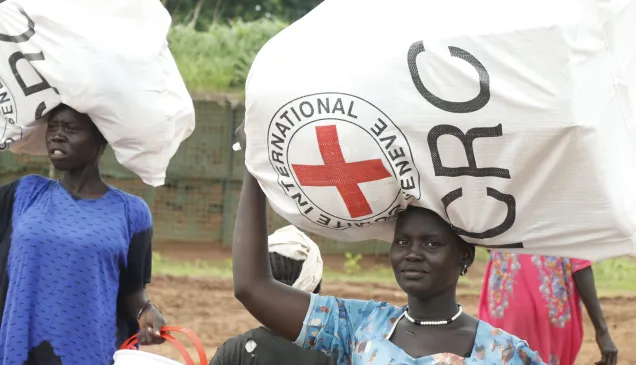Second Conference of States Parties to the Arms Trade Treaty
Speech given by Ms Christine Beerli, Vice-President of the ICRC, at the Second Conference of States Parties to the Arms Trade Treaty in Geneva.
On behalf of the International Committee of the Red Cross, I am honored to address this second Conference of States Parties of the Arms Trade Treaty (ATT).
As we know, the ATT seeks to address the human suffering caused by insufficient controls over transfers of conventional weapons. The severity of these consequences cannot be overestimated. The proliferation of arms and ammunition facilitates violations of international humanitarian law (IHL) and of human rights law, including acts of terrorism and sexual and gender-based violence. It fuels a never-ending spiral of violence that leads to protracted armed conflicts. In most of the countries where the ICRC works – be it Central African Republic or Iraq, Libya or Yemen, to name but a few – we continuously witness first-hand the terrible consequences of weapons being used against the very people whom the law is designed to protect – civilian men, women and children.
In Syria, for example, five years after the outbreak of violence, the humanitarian needs are greater than ever. In many areas within the country, civilians are struggling to survive day to day, enduring fierce fighting and a steady deterioration of living conditions, with no end in sight to their suffering. Many tens of thousands of people have been uprooted multiple times as fighting has shifted.
Another example is South Sudan, where an ever-expanding circle of armed violence continues to have traumatic humanitarian and economic consequences for the population. Since early July alone, when violent clashes erupted in Juba, hundreds of people have been killed or injured, and tens of thousands displaced.
Moving to Latin America, the last two decades there have seen the emergence of other forms of armed violence with alarming humanitarian consequences for the populations of numerous countries. Preventing the diversion of small arms and light weapons and combatting their illicit trade is a major challenge for the continent and more generally for every State.
Back in the Middle East, recent reports attest to how arms are being transferred to States in that region, from which they are then diverted to parties that use them in the brutal armed conflicts ravaging Syria and Yemen. Without the vigorous preventive action that ATT States Parties have committed to, the unregulated flow of arms will only continue to cause devastation.
With the ATT, States have a renewed opportunity to act and make a difference on the ground by ceasing arms flows to armed conflict zones where serious violations of IHL are manifestly occurring. At the heart of the treaty are its humanitarian objectives – the moral and legal imperatives to prevent human suffering and to respect and ensure respect for IHL and human rights through the strict control of arms transfers. This in turn will create an environment conducive to building peace and security, at regional and global levels.
Although the ATT has been in force for less than two years, the number of States that have committed to the treaty is impressive, with 87 States party and a further 46 signatory States. But if the treaty's promise of reducing human suffering is to be fully realized, more States must adhere to the treaty and it must be implemented in good faith, with the highest possible standards of implementation.
In order to build confidence among States Parties and the public that the treaty is being faithfully implemented, openness and transparency are essential. Indeed, they are essential to the treaty's credibility. The ICRC therefore welcomes that most States Parties that have submitted their initial and annual reports have made them publicly available, and we call on all other States Parties to do the same. Likewise, the meetings of the subsidiary bodies established by the Conference to consider the treaty's implementation should as a rule be public. This is crucial to developing a culture of responsibility and accountability in the international arms trade, which is a key purpose of the ATT.
Transparency of reports and meetings is also important to facilitate cooperation and assistance efforts, by helping to identify areas where States Parties may be in need of support. The ICRC encourages States Parties to share their practical experiences of national implementation, including how export assessment authorities ensure respect for IHL and human rights law in arms transfer decisions. Sharing good practices would be an effective means for States Parties to help each other in complying with their obligations.
This week, the conference will consider establishing the Voluntary Trust Fund, as required by the ATT. The Trust Fund is an important means to mobilize resources to help those States Parties in need of assistance to effectively implement the treaty. For example, support from the Trust Fund could help to build the capacity needed to effectively manage stockpiles of weapons and control borders, essential measures to prevent the diversion of arms to the illicit market. The ICRC urges all States in a position to do so to contribute to the Voluntary Trust Fund once it is established.
I thank you for your attention and wish you a very productive conference.



